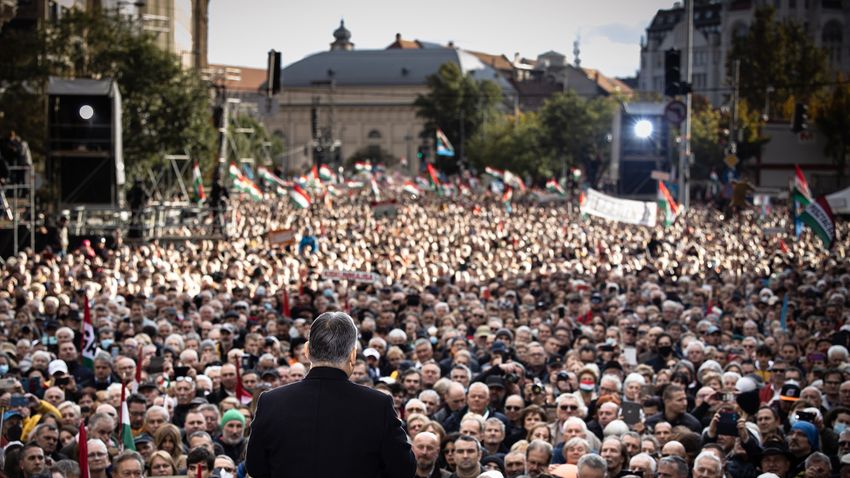Werner J. Patzelt, one of Germany's best-known political scientists, who has been a regular participant in political programs on German television for decades, has written a filling book about our country.
In 2021, Professor Patzelt cut his ax on a big tree: not only did he leave his quarter-century career at the Dresden University of Technology to spend a year as a visiting researcher at the Hungarian-German Institute of the Mathias Corvinus Collegium, but he also decided to help explain Hungary in his home country, which is sometimes quite incomprehensible to them, with a book seeming politics.
The fruit of this work is the recently published chunky volume entitled Ungarn verstehen: Geschichte, Staat, Politik (Understanding Hungary: History, State, Politics) the Germans don't understand us.
"What I missed was a book about Hungary and its contemporary political development, which can reliably inform both enemies and friends of the Hungarian Fidesz government - especially those who want to make their judgment about Hungary not at the beginning of their engagement with the country, but at the end of it" - declares the purpose of the professor's book in the preface of the work.
Strange German pictures of Hungary
In the first part of his book, Patzelt deals with the different types of images of Hungary developed in Germany, from naive images inspired by the Balaton vacations of East Germans to
until the constructed image that the Hungarian opposition created in Germany in cooperation with the German media.
It also sheds light on the special significance of Viktor Orbán's 2014 speech in Tusvány on illiberal democracy in Germany. While we in Hungary remember Konrad Adenauer, the West German chancellor after the Second World War, as one of the founding fathers of Europe and one of the founders of Western European prosperity, in Germany, according to Patzelt, already in the 1970s and 1980s, the image was formed that they had finally left behind the "illiberal-repressive Adenauer times". Germans did not learn about the concept from Fareed Zakaria around the turn of the millennium, but it had already been part of their public discourse for decades, with a seriously negative connotation.
That is why Patzelt evaluates as a colossal blunder the fact that Viktor Orbán tried to introduce the concept of illiberal democracy instead of the authoritarian, fascist and other adjectives used for him at the time.
and with this he "issued a permanent invitation to critics of his government practice for normative criticism".
At the same time, he states: Hungary is clearly a democracy for him.
"The system of personal loyalty relationships systematically built up under Viktor Orbán, which stretches between him as the caretaker of the country, and between the financial and economic leaders who are politically dependent on the state, is clearly against the fundamental principles of plural democracy.
At the same time, such a system fits well with the basic idea of a plebiscite democracy.
In such cases, a political leader authorized in elections has the right to exercise the leadership of the state during the election cycle - precisely for the sake of democracy - in such a way that he is able to effectively shape all areas of society that can be influenced by politics."
- claims the professor of comparative democracy research.
In the book, Patzelt also sheds light on the background of the cool Fidesz-CDU relationship: "The German union parties, which have been experiencing their slippage from power since 2015/16, are hurt from the start by any comparison with the successful Fidesz, which - since it still strongly believes that its own policy is an alternative in its correctness - it made him move away from Hungary", analyzes the professor.
According to him, understanding is also made difficult by the significantly different development of the Hungarian and German media systems.
While Germany today has the same left-liberal press dominance that prevailed in 2010,
In Hungary, the Orbán government took active steps to balance media relations. From Germany - where the left-liberal media predominance is a natural, obvious thing - it seemed that the "objective, therefore correct" press is increasingly being displaced by the "partisan, therefore incorrect" press.
Government and History
After that, Patzelt enlightens his German readers over hundreds of pages about the historical antecedents shaping contemporary Hungarian politics, from Saint Stephen to the Tatar invasion, King Matthias and Trianon to the return of the communist successor party in 1994. From this he deduces that the different historical development leads the Hungarians and the Germans to diametrically opposed concepts of statehood:
the Germans are "waiting for redemption from their history, which they perceive as having been pierced",
for them, the perspective of "turning from an ethnically descriptive people into a multi-ethnic population and their own country becoming a kind of federal state of the European Union" is attractive to them.
In comparison, for the Hungarians, "a naturalness that does not require further justification,
that they want to continue to exist as a special nation in a self-governing state".
Starting from these different visions of the future, he therefore calls on the Germans reading his book to "at least allow the idea that there may be natural semblances different from their own", otherwise they will not understand Hungary.
In this spirit, he continues to present Hungary's political institutional system. He notes that the country's small size and population inevitably lead to the formation of cross-sector family and friendship relationships, alliances of protection and defiance, and networks. He describes that Fidesz's two-thirds majority is not due to some kind of distorted electoral system, but rather to the fact that its popularity in the countryside is unbroken, and since 80 percent of Hungarians do not live in Budapest, the majority of constituencies will inevitably be in the countryside - on the other hand, in Budapest, Fidesz hardly has a chance to kick the ball. It also dispels the myth that
that the surplus of campaign resources of the governing parties is some kind of Hungarian authoritarian trait:
"This is the practice elsewhere in Europe, so to speak, this is the benefit of previous electoral successes".
Political culture
The chapter preceding the analysis of the main policy measures of the Orbán government, which talks about Hungarian political culture, is also very instructive from a Hungarian point of view. We learn from it that the polarization of Hungarian public life is truly unparalleled ("it is conniving to the point of complacency, polemical to the point of personal hatred, and so adamant that it even rejects the facts when the opposing side refers to them").
Also describe, supported by numbers,
how passive Hungarian society is in public life
not only in terms of its civil activity compared to Germany, which is located in the middle of Europe, but also compared to the other Visegrád countries - moreover, far from 2010, but rather since the regime change.
Instead of an active civil society, in our country it is "much more a matter of a country in which a "good-willed state governor" - but only a proven good-willed and successful one -
he is ready to submit as long as his personal freedoms are not interfered with"
- says Patzelt.
Similarly, on the basis of data, it overturns the opinion that Hungary is "anti-EU", which sounds like complete nonsense in this country, but is very widespread abroad. He characterizes the attitude of Hungarians towards the EU as follows:
"they see value in the EU as a zone of common security and prosperity, in which the nation-states of Europe will continue to exist quite naturally, and within their own framework - with mutual respect and on the basis of common basic rules - they can keep and nurture everything that belongs to them, and perhaps really only to them , it is simply important."
Overall, he considers it very important to interpret Hungary based on the peculiarities of Hungarian political culture, and not in some kind of universal, shallow framework: "It would do no harm to try to understand Hungary's government system and politics basically in the light of the country's special cultural prerequisites and historical development - and not only according to the historically often excessively shallow categories of comparative democracy research”.
Orbán land?
Perhaps the most valuable chapter of his book is the closing one, in which "Orbánfölde!" and "Orbán land?" under the title presents two parallel narratives of Hungary in an equally convincing manner, data and arranged in a logical sequence. One is the opposition narrative about Hungary's slide from a model country to a deterrent example, about the establishment of authoritarian governance, its ideological fig leaves, and the methods of exercising power of the Hungarian autocracy.
The other is the government party's narrative about the conservative revolution of 2010,
about Hungary, which is being built as an alternative to the liberal state, about its cultural and political theoretical foundations, as well as how the majority sees the results of 13 years.
In his afterword, he leaves it up to the reader to decide which narrative of "Orbánfölde" he accepts as more valid, but offers criteria for the decision. For example, the two possible perceptions of corruption in Hungary: personal enrichment and non-transparent exercise of power on the one hand, and the formation of Hungarian capital and the counterbalancing of the neoliberal network formed as a result of spontaneous privatization on the other.
He reveals what Niccolò Machiavelli would say about Viktor Orbán,
he describes his opinion on the functioning of the opposition in Hungary - and at the end he concludes with a quite brilliant parallel to Bavaria.
It states that the Free State of South Germany was governed by the Christian Socialist Union (CSU) between 1966 and 2008 in such a way that no politician from another party ever held a ministerial post. Among their three charismatic politicians, Alfons Goppel, Franz-Josef Strauß for 10, and Edmund Stoiber for 8 years, they also received plenty of corruption accusations, and not all of them were unfounded.
Was Bavaria an "electoral autocracy" in this long half century, a "CSU semi-dictatorship",
maybe "simulated democracy"? Or was the CSU's long and stable power the result of "the government of Bavaria producing results in the development of the province to which the population responded with satisfaction"?
In traditional Patzeltian fashion, he leaves the answer to the reader here as well - but here it is already somewhat predictable which explanation the author is leaning towards. And this chapter alone is worth reading for us Hungarians. Well, even for the Germans.
Featured image: MTI/Viktor Orbán's Facebook page












